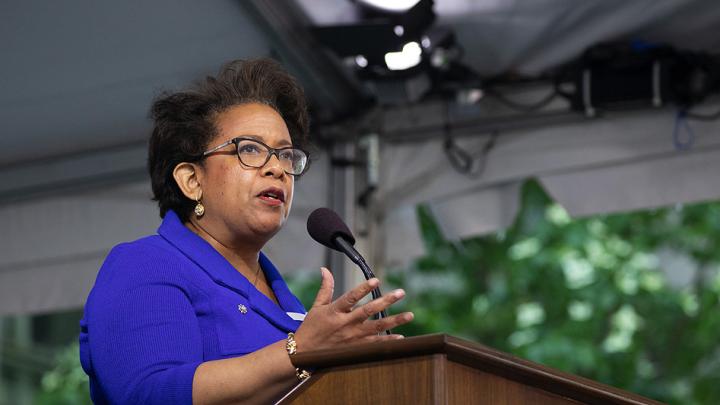Speaking at Harvard Law School’s 2022 Class Day ceremonies on Wednesday, May 25, former U.S. Attorney General Loretta Lynch ’81, J.D. ’84, said that justice—the fight for freedom—is something each generation must defend. She reminded the audience that exactly two years ago to the day, George Floyd had “lost his life under the knee of a uniformed Minneapolis police officer. It was a shocking crime,” she said, “a senseless tragedy. It did not have to happen. And for those of us who have worked on police reform over the years it stood as a literal rebuke to all of our efforts.” Lynch, who has spent her career defending civil rights, no doubt felt the rebuke viscerally: she was a member of the trial team whose work in the late 1990s led to the conviction of New York City police officers for the assault, torture, and rape of Abner Louima, a Haitian immigrant. “I know that many of us struggle to make sense of a legal system where the ultimate symbol of protection to so many,” she said, “is also an inherent symbol of fear to so many others.”
A former federal prosecutor who became the first black woman to lead the Department of Justice, from 2015 to 2017, Lynch described the “equally shocking and unnecessary deaths of Breonna Taylor and Ahmaud Arbery” as “a choice…not to deal with the original sin: the systemic racism woven into the fabric of our society.”
“But something happened” after George Floyd’s death, she continued. “As people marched and spoke, they were joined by a broad swath of humanity, both in this country and around the world. We actually came together in an epiphany of understanding and empathy that began to fuel what we hoped was systemic change. And we saw the possibility of change that recognized the costs of pernicious racism, not just to its immediate victims, but to all of us. And we began to explore…why we continue to let a distinction without a difference repeatedly tear us apart.”
Addressing the class directly, she told them “You are entering a world that has seen a dizzying reversal of so many of those efforts”: of war in Europe—and in the United States, efforts to curtail the right to vote, and a “reversal of the individual’s right to make one of the most private and consequential decisions of their lives, on their own…to spare some people discomfort.”
Lynch, the granddaughter of a sharecropper who helped black people relocate from the Jim Crow South to the North, said that “It’s vital to see those repressive efforts for what they truly are: a backlash to generations of progress, and to real change that was beginning to take hold. …We’ve seen how power consolidates to try and slam shut the doors that we have forced open. This backlash has always followed, as night follows day, as Jim Crow followed Reconstruction.”
The lesson to learn, Lynch said, is not that the fight has been lost, but that the gains have struck a chord, and that “it falls to every generation to defend them in their own time.” The price of freedom, she said “is constant vigilance.”
She concluded by sharing the words of one of her favorite philosophers, the theologian Reinhold Niebuhr, to underscore the long-term, multi-generational commitment required:
Nothing that is worth doing can be achieved in our lifetime. Therefore, we must be saved by hope.
Nothing which is true or beautiful or good, makes complete sense in any immediate context of history. Therefore, we must be saved by faith.
Nothing we do, however virtuous, can be accomplished alone. Therefore, we must be saved by love.
No virtuous act is quite as virtuous from the standpoint of our friend or foe, as it is from our standpoint. Therefore, we must be saved by the final form of love, which is forgiveness.
“As all of you embark upon your own path,” she said in farewell, “I wish you hope for the future, faith in your efforts and in your fellow man; love for those around you, and forgiveness for, and from, our human foibles. Congratulations, my newest colleagues, I cannot wait to see what you will achieve.”








